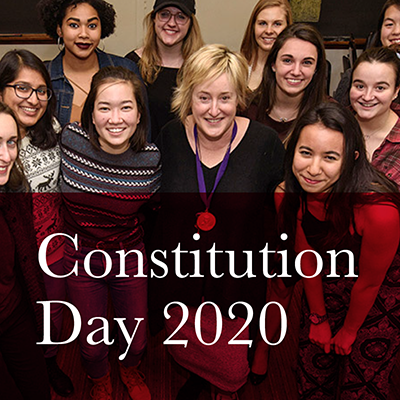
Constitution Day 2020: "When Women Won the Right to Vote - A History Unfinished" with Professor Lisa Tetrault
- Wednesday, September 16, 7:00 p.m.
- Online Event
The year 2020 marks the 100th anniversary of the passage of the Nineteenth Amendment, and Carnegie Mellon University Libraries and Division of Student Affairs are proud to welcome Lisa Tetrault, Associate Professor of History, as the featured speaker for our annual Constitution Day event.
In this online lecture, Professor Tetrault explains how, contrary to popular assumption, the right to vote does not exist in the United States Constitution or United States law. When women won passage of the Nineteenth Amendment in 1920, they did not win the right to vote, despite repeated claims that they did. Just what did the women’s suffrage amendment do, then? Clarifying this history, Professor Tetrault also positions 1920 as the middle of a much larger story about the pursuit of voting rights, a struggle that is unfinished and ongoing today.
According to Tetrault, there is much for the audience to gain. “Most people have no idea they possess no right to vote. This talk will use the past to frame the present and help all understand just what they are entitled to as citizens.”
Carnegie Mellon has presented these lectures since 2005, previously covering topics like gerrymandering and the Civil War Amendments. All colleges receiving federal funding are required to participate. A notable addition to the lecture will be the Libraries’ first edition Bill of Rights presented by Sam Lemley, Curator of Special Collections.
Register to attend this online event.
About the Speaker
Lisa Tetrault is an Associate Professor of History at Carnegie Mellon University's Dietrich College of Humanities and Social Sciences. She specializes in the history of gender, race, and American democracy –with an emphasis on social movements and memory.
Her path-breaking book “The Myth of Seneca Falls: Memory and the Women’s Suffrage Movement 1848-1898” won the Organization of American Historians’ Mary Jurich Nickliss book prize in 2015. Her research has been funded by the Smithsonian Institution, the National Endowment for the Humanities, the Radcliffe Institute at Harvard, and the Library of Congress.
